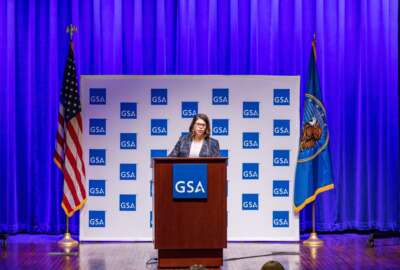New Army chief of staff targets ‘the network’ as top modernization priority
In today's Federal Newscast: Some feds in the Evergreen State might soon get a boost in locality pay. The new Army chief of staff targets "the network" as his top...
- The Army’s new chief of staff said his top modernization priority is still the network. In a speech at the annual AUSA conference in Washington yesterday, Gen. Randy George said, most of all, that means making the Army’s network a lot less complex. He said instead of huge antenna farms and server stacks, commanders need to be able to access the data they need with something as simple as a tablet. To help get there, the Army has just issued the third in a series of queries to vendors to help build its new Unified Data Reference Architecture. The goal is to build a distributed “data mesh” that all Army acquisition programs can share.
- The Biden Administration is, once again, calling for a major overhaul of the government's biggest pay system. The General Schedule, which pays 1.5 million federal employees, does not account for major differences in pay among different occupations. Federal leaders say the system has also created a 24% wage gap between federal workers and their private sector counterparts. There have been calls for legislative reforms to federal employees' pay for years. But it would cost an estimated $22 billion to bring federal salaries in line with the private sector.(Pay agent renews calls for ‘major legislative reforms’ to federal pay - Federal News Network)
- A top White House official is calling for reforms to the government’s cloud security process. The Microsoft Exchange hacks earlier this year displayed the shortcomings of the Federal Risk and Authorization Management Program (FedRAMP), according to Anne Neuberger, deputy national security adviser for cyber and emerging technology. "FedRAMP was last updated in 2013. Clearly, much has changed in the cloud, our reliance on the cloud, as the government, as the private sector has changed,” Neuberger said, adding that agencies are taking the initial steps to reform FedRAMP. New guidance from the Office of Management and Budget is expected soon.(CyberNext 2023 - Center for Cybersecurity Policy and Law )
- A federal executive who helped rethink office space for government employees is stepping down. Nina Albert, commissioner of the Public Buildings Service at the General Services Administration, is leaving the agency and federal service on Friday. Albert testified before several House and Senate committees this year. There she faced bipartisan calls to make better use of federal office space and get rid of buildings that agencies no longer need. Albert said those office-space needs are changing, because more federal employees are working from home for part of the work week. “The tagline that I always use is we want better buildings, but fewer buildings,” Albert said.(GSA official who reshaped federal office space in pandemic era leaving government - Federal News Network)
- An IT leader for the Marine Corps has moved on after more than two decades of government service. Reneta Spinks, the deputy chief information officer for information, command, control, communications and computers at the Marines Corps, left federal service at the end of September after 24 years. Spinks had been the deputy CIO for IC4 for more than two years and worked for the Marines since 2018. She is now CEO of CyberSec International, her own consulting firm. During her federal career, Spinks also worked for the IRS and the Immigration and Customs Enforcement directorate in senior IT management roles. (Reneta Spinks LinkedIn page - LinkedIn)
- Some federal employees living and working near Seattle may soon see bigger paychecks. The President's Pay Agent is adding Jefferson and Clallam counties to the Seattle locality pay area. That means General Schedule employees in those two counties will have a bigger locality pay boost tied to their future raises, although it is unclear when exactly that change will take effect. The Office of Personnel Management still has to approve the expansion through the rulemaking process. But depending on how long that takes, those feds could see bigger paychecks as early as 2024.(Pay agent renews calls for ‘major legislative reforms’ to federal pay - Federal News Network)
- After almost a decade, changes could be coming to size and socioeconomic protest requirements for small business set-aside contracts. The Small Business Administration clarified when size protests should be submitted for multiple-award indefinite-delivery indefinite-quantity type contracts. SBA also wants to allow socioeconomic protests for multiple-award IDIQ contract set-asides for HUBZone, service-disabled veteran-owned, women-owned or economically disadvantaged women-owned small businesses, that are not partially or completely set aside. The Federal Acquisition Regulatory Council is seeking comments on these proposed changes by early December. (Changes might come to small business set aside protest rules - Federal News Network)
- Get ready for the price of stamps to go up next year. Among the changes, the Postal Service is planning to charge 68 cents for a first-class stamp. That is up from the current price of 66 cents. If approved by a USPS regulator, the new rates will go into effect on January 24. This marks the Postal Service’s fifth price hike since 2021, but the agency said its rates are still a bargain compared to what it costs to send mail in other countries.
- The Air Force’s Air Combat Training System needs technology to help provide an “integrated realistic training environment” to support on and off-site aircrew and ground support crew training. In a new solicitation, the Air Force wants technology to help the system stay on top of real-world threats through cutting-edge training. The solicitation is set-aside for small businesses. The Air Force plans to field the system at two bases in Arizona and New Mexico.
- Critical infrastructure operators and operational technology vendors need to make sure they secure their open-source software, according to guidance issued by the Cybersecurity and Infrastructure Security Agency this week. CISA said best practices include supporting the adoption of security tools in the open-source community and managing software vulnerabilities. The agency also urged companies to establish good patch management procedures and securely verify the identity of their users.
- The Small Business Administration is turning up the heat on fraudsters in the HUBZone small business program. SBA said it will take five steps as part of a renewed effort to root out fraud and reinforce the integrity of the contracting program. Among the new initiatives are soon-to-be-proposed revisions to the HUBZone regulations to further clarify and strengthen requirements for businesses which hire people who live in a HUBZone. SBA is also removing companies which claim to hire workers who live in a HUBZone, but do not, and will increase audits of companies in the program to make sure they are following the rules.(SBA adds new safeguards to HUBZone program - SBA.gov)
Copyright © 2025 Federal News Network. All rights reserved. This website is not intended for users located within the European Economic Area.
Peter Musurlian
Peter Musurlian is a producer at Federal News Network.
Follow @PMusurlianWFED
Related Stories
Air Force discovers higher salaries aren’t the only answer to its child care shortage
Related Topics






